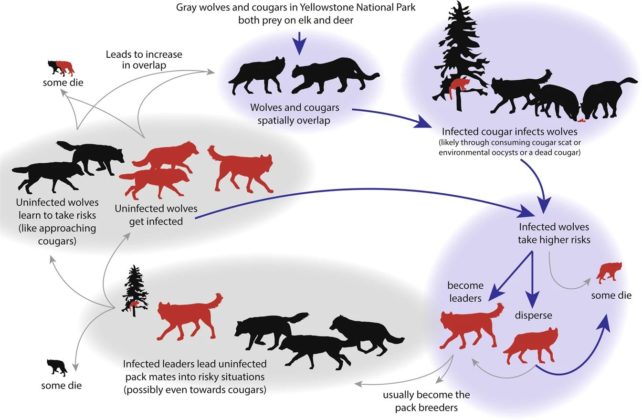A study analyzing 26 years of data on wolf behavior and blood samples from 229 wolves reveals that infection with the parasite Toxoplasma gondii increases the likelihood of wolves becoming pack leaders by 46 times. This research indicates that the impact of this parasite in the wild has been significantly overlooked, and its role in animal behavior and ecosystems has been underestimated. Toxoplasma gondii, commonly known to cat owners, can sexually reproduce only in felines but can infect and thrive in various warm-blooded animals, including humans. In humans, it can cause toxoplasmosis, a potentially fatal but typically symptomless parasitic disease.
Once the parasite is in a host, individual T. gondii parasites need to find a way to return to a cat to reproduce. Infected animals, such as rats, tend to take more risks and may even become fatally attracted to the scent of feline urine, thereby increasing their chances of being killed by cats. For larger animals like chimpanzees and hyenas, infection with T. gondii raises the risk of encountering larger predators. In the case of gray wolves in Yellowstone National Park, their territory overlaps with cougars that carry T. gondii, and both species prey on elk, bison, and mule deer. It is possible that wolves become infected by consuming dead cougars or ingesting cougar feces.
Data collected on wolf behavior over nearly 27 years provided a rare opportunity to study the effects of the parasite on a wild intermediate host. The research team, led by biologists Connor Meyer and Kira Cassidy of the Yellowstone Wolf Project, also examined blood samples from wolves and cougars to determine the rate of T. gondii infection. They found that wolves with significant territory overlap with cougars were more likely to be infected with T. gondii. Infected wolves showed significantly increased risk-taking behavior. They were 11 times more likely to disperse from their pack into new territory, with infected males leaving their pack within six months, compared to the typical 21 months for uninfected males, and infected females leaving within 30 months, compared to 48 months for uninfected females.
Infected wolves were also significantly more likely to become pack leaders as T. gondii may lead to increased testosterone levels, which could result in heightened aggression and dominance, traits that would help a wolf to assert itself as a pack leader. This has important implications as pack leaders are the ones who reproduce, and T. gondii transmission can be congenital. Moreover, it can impact the dynamics of the entire pack. The infected pack leaders can influence their pack mates and group decisions due to the group-living structure of the gray wolf pack. Their behavioral changes triggered by the parasite may create a dynamic where the behavior of one wolf influences the rest of the wolves in the pack.
This could result in a feedback loop of increased overlap and infection, demonstrating that seemingly insignificant and understudied factors can have a substantial impact on ecosystem dynamics. The researchers suggest that understanding the implications of parasite infections in future wildlife research is crucial for comprehending the effects of parasites on individuals, groups, populations, and ecosystem processes. The study has been published in Communications Biology.



/wion/media/media_files/2025/03/30/B1xgUHuPTxMh8iNXB0N4.png)











